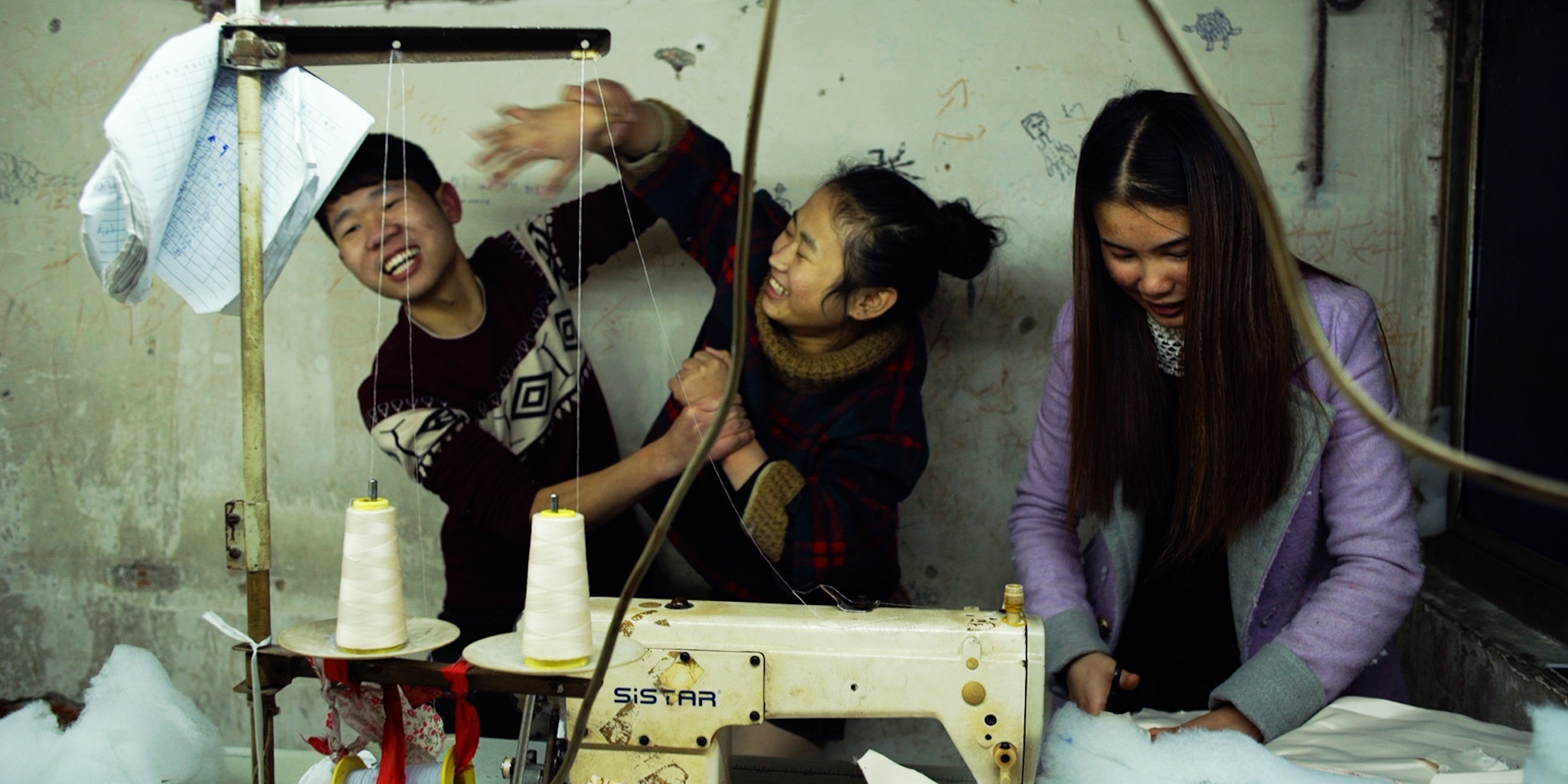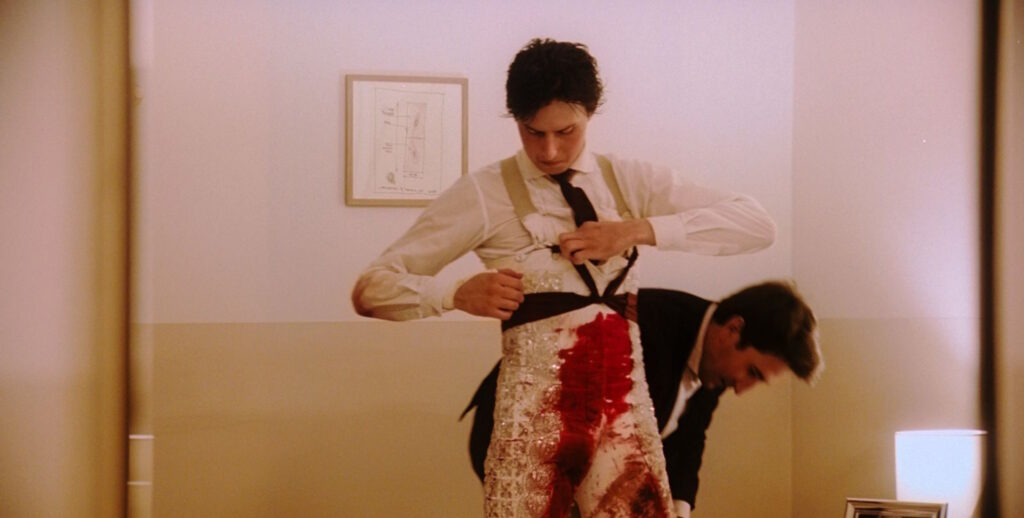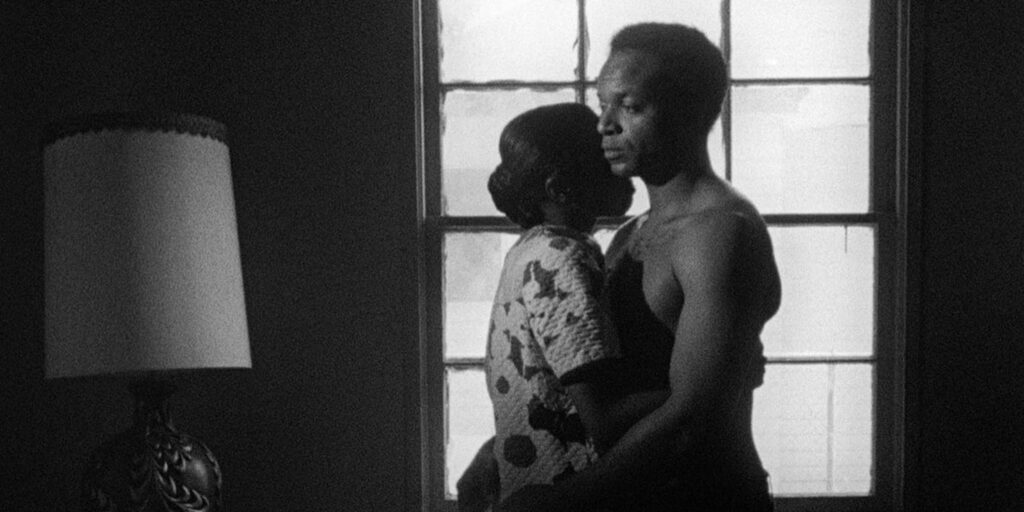The Zhili district of Houzhou, China, is home to some 18,000 garment workshops, the majority of them small-scale, privately owned operations. This is the buzzing heart of Houzhou’s children’s-apparel industry, which produces a staggering quantity of brightly colored, machine-sewn clothing, chiefly for the domestic market, but also for international buyers. There’s no automation here: Production relies on workers hunched over battered sewing and serging machines, churning out one garment at a time. Zhili’s shops employ upwards of 300,000 workers, most of whom are teenage and twentysomething migrants from neighboring provinces.
From 2014 to 2019, acclaimed documentarian Wang Bing embedded himself in this community, capturing the lives of the young stitchers at several different workshops, observing them in their endless, repetitive labors and their all-too-brief downtime. From this raw material, Wang has crafted a monolithic three-and-a-half-hour feature, exploring an uncanny world where youth’s boundless energy intersects with the despairing grind for economic survival in the People’s Republic. However, compared to some of the filmmaker’s prior works – such as the nine-hour West of the Tracks (2002) and the eight-hour Dead Souls (2018) – Youth (Spring) practically qualifies as slight.
Unlike Wang’s superficially similar Bitter Money (2016), the director’s latest effort is not really an exposé of China’s garment industry, despite the dreary, tedious, and often wretched working conditions of its subjects. Instead, Youth (Spring) functions as something closer to an anthropological document, a portrait of a remarkable cohort of young workers who are eking out a livelihood in a system that repurposes their jittery ambition (and, often, their desperation) for its own rapacious ends. Over the course of five years, Wang plainly developed a fondness for both his subjects’ pragmatic fortitude and the joie de vivre that they somehow maintain in the grim, garbage-strewn heart of 21st-century industrial China.
Most of the workers that the film follows are in their late teens or early 20s, although there are a handful of thirtysomethings in the mix. One adolescent stitcher works alongside his mother, who does her best to keep the petty, hormone-fueled quarrels (and occasional fisticuffs) on the workshop floor to a minimum. The majority of the subjects seem to hail from Anhui province, a farming and mining region that has been slower to develop than its neighbors. By day, the workers whip out perfectly straight lines of stitching, one after the other, without missing a beat. Meanwhile, the stitchers chain-smoke cigarettes, listen to music, and flirt with their seatmates. The relatively relaxed atmosphere on the shop floor belies the lightning pace and high-stress character of the work. By night, they retreat to dismal concrete dormitories owned by their employers, doing their laundry in plastic wash tubs and crawling into their bunks to recharge.
Wang’s method is purposefully loose and fragmented. The film follows narrative threads for a time and then abandons them, rarely circling back to provide the viewer with closure. Each worker is identified on-screen by their name, age, and home province, but Youth (Spring) eschews the usual documentary approach of zeroing in on one or two particularly charismatic characters. The director seems to shape his style to match his subjects, who exhibit a seasoned hyper-focus when bent over their sewing machines but elsewhere display all the distracted listlessness that one expects of bored barely-adults. Subplots flicker past with scant impact on the monotonous routine of whirring bobbins: a woman negotiating time off for an abortion; a friendship that explodes due to a botched order; a romance that seems to blossom and then cool in the space of a single cut.
Most of the feature’s drama, such as it is, revolves around money. The owners of Zhili’s garment shops compensate by the item, and although the workers are at a disadvantage, economic power-wise, they seem unafraid to pressure their employers for better pay. The middle of the film features a tense confrontation between a miserly manager and his fed-up employees, who essentially stage a walkout to demand a pay bump commensurate with the city’s prevailing rates. The workers stand in downcast silence as their boss berates them for their ungrateful laziness, but this tirade proves to be just the pro forma opening salvo in a complex negotiation. Wang’s feature returns again and again to this fundamental tug-of-war between labor and management, and to the peculiar shapes it assumes in China’s crypto-capitalist, globalized economy.
Whether this material can sustain a viewer’s interest for 212 minutes will probably boil down to personal taste. This critic found the film absorbing in its unvarnished way, especially once its distinctive, chattery rhythm begins to emerge. Undeniably, Youth (Spring) has a repetitive quality, as the same conflicts recur in slightly different contexts and the faces of the young workers begin to blur together. All the men are skinny and sport the same shaggy haircut, and all the women wear short skirts and wield sharp tongues. They gossip, squabble, and provoke one another, and some of their antagonism would doubtlessly be described as bullying or harassment by a Western viewer. Even when their behavior is at its most shallow and puerile, however, their hungry vitality remains captivating, and Wang’s affection for them always feels genuine. The dispiriting sameness he uncovers in each shop, each day, and each stitch ultimately expresses his empathy for the difficult circumstances in which they toil.
Youth (Spring) screens Sunday, Jan. 21 at 6:00 p.m. at the Webster University Film Series.




